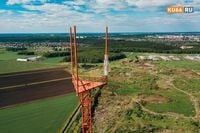On May 9, 2025, users across Russia reported significant disruptions in mobile communications, particularly affecting major operators such as MTS, Megafon, and Tele2. This surge in complaints coincided with the Victory Parade, a national event marked by extensive restrictions and preparations, leading to widespread connectivity issues.
The problems began early in the morning, with many users taking to social media and platforms like Downdetector to voice their frustrations. Reports indicated that the disruptions could lead to a complete shutdown of mobile communications, including internet access, calls, and SMS, particularly in Moscow from 9:00 AM to 12:00-1:00 PM, as anticipated by the operators themselves. However, as of now, the telecommunications companies have not provided any official comments regarding the situation.
In the days leading up to the parade, particularly on May 7, users had already experienced instability with banking applications and online services due to similar disruptions. Major financial institutions like Sberbank and YuMoney warned customers of potential difficulties with transfers and accessing their accounts. Other services, including Yandex and Lamoda, also reported issues stemming from the unreliable internet.
In addition to the communication issues, Moscow faced severe restrictions on transportation due to the parade rehearsals. Key streets, including Tverskaya and parts of the Garden Ring, were closed, and parking was prohibited for taxis, car-sharing services, and bicycles. Authorities announced that similar restrictions would be enforced on May 9, with closures expected from the evening of May 8 until the afternoon of May 9.
Moreover, the situation in St. Petersburg mirrored that of Moscow, with extensive road closures and restrictions on public transport due to the parade preparations. Streets such as Nevsky Prospekt and Admiralteysky Prospect were blocked off, affecting traffic flow and accessibility throughout the city.
As the disruptions continued, the demand for public Wi-Fi networks surged, with companies like Hot-WiFi reporting increased usage as residents sought alternatives to the failing mobile networks. This spike in demand highlighted the reliance on mobile connectivity for everyday activities, particularly during significant national events.
One of the underlying issues contributing to these failures is the disparity in data transfer capabilities between urban centers and smaller towns. According to the Banks.ru portal, internet speeds in the regions have plummeted to an average of just 15 Mbit/s, while in Moscow, speeds soar to 89 Mbit/s for Megafon, 61 for MTS, 58 for Beeline, and 36 for Tele2. This stark contrast underscores the challenges faced by users outside major metropolitan areas.
Additionally, a critical shortage of base stations and equipment has hampered the ability of providers to deliver quality service in the regions. The departure of all strategic telecom providers from Russia in 2022 has left a significant gap in infrastructure, exacerbating the existing issues. Furthermore, the current telecommunications framework lacks sufficient radio frequencies to manage the traffic demands effectively. While programmers are using 4G frequencies, experts have pointed out the necessity of transitioning to 5G to meet growing demands.
In response to these challenges, President Vladimir Putin has instructed the government to urgently develop a strategy for the digital sector, aiming for a comprehensive plan by 2035. This initiative seeks to bolster the domestic IT industry and ensure that it does not fall behind amidst these ongoing disruptions.
As the country grapples with these connectivity challenges, the impact on daily life is becoming increasingly apparent. The combination of transportation restrictions and mobile communication failures has left many residents feeling isolated and frustrated. The situation raises questions about the preparedness of the telecommunications infrastructure to support essential services during significant national events.
Looking ahead, it remains to be seen how the government and telecommunications providers will address these critical issues. With the Victory Parade serving as a backdrop for these disruptions, the need for a robust and reliable communication network has never been more evident. As citizens navigate these challenges, the hope is that swift action will be taken to restore connectivity and improve the overall quality of mobile services across the nation.





